Mental Health Report: Paranoid Schizophrenia, Diagnosis, and Support
VerifiedAdded on 2020/01/21
|11
|4298
|67
Report
AI Summary
This report examines the multifaceted aspects of mental health, specifically focusing on paranoid schizophrenia. It begins by defining mental health and illness, relating the diagnosis of schizophrenia to these concepts. The report then delves into the possible causes and functional difficulties associated with paranoid schizophrenia, including hereditary and environmental factors, as well as work-related, financial, and activity limitations. The impact of a diagnosis on the individual, encompassing effects on family, friends, and emotional expression, is thoroughly analyzed. Finally, the report explores various types of support and treatment options available for individuals with paranoid schizophrenia, providing a comprehensive overview of this complex mental disorder.
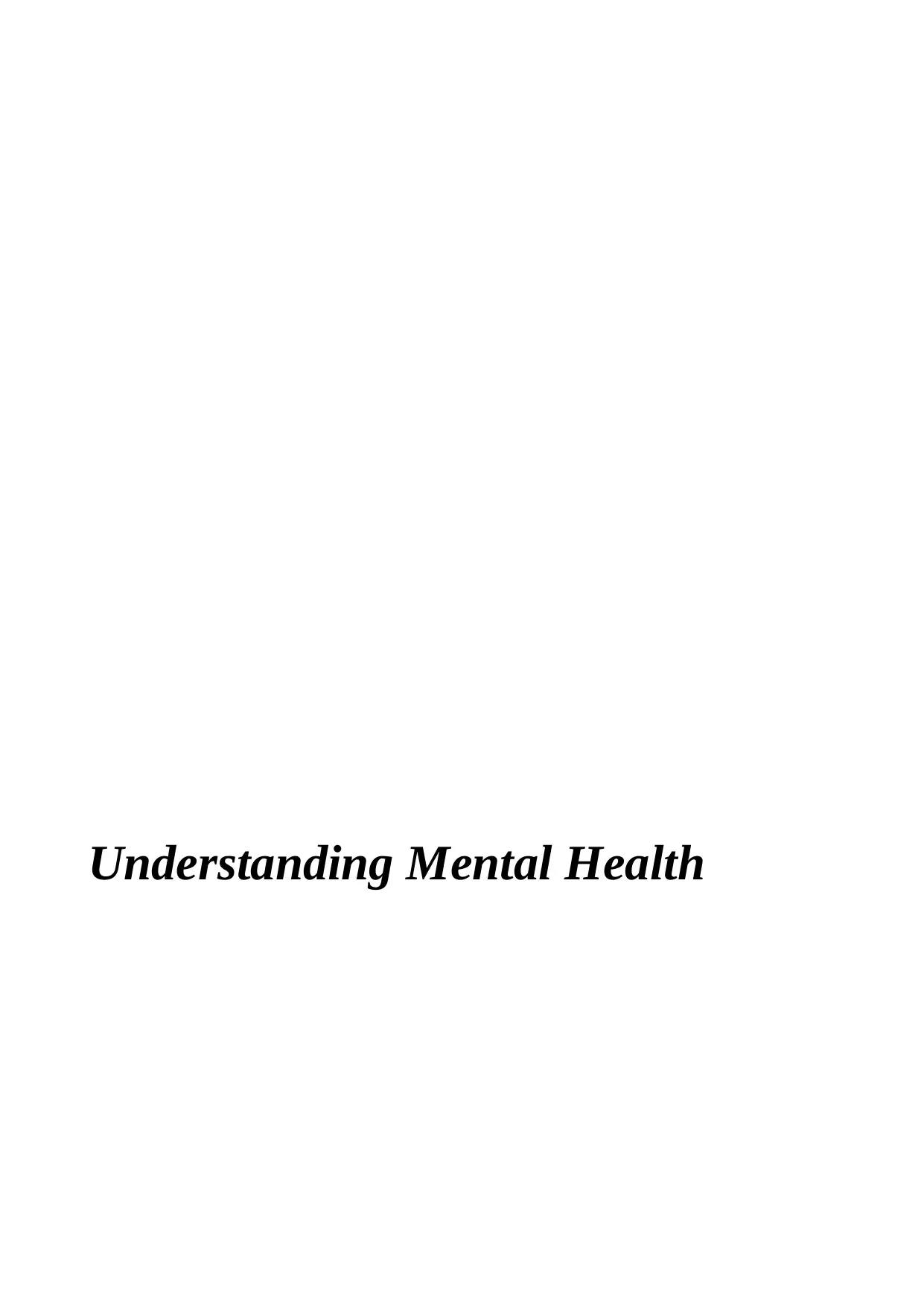
Understanding Mental Health
Paraphrase This Document
Need a fresh take? Get an instant paraphrase of this document with our AI Paraphraser
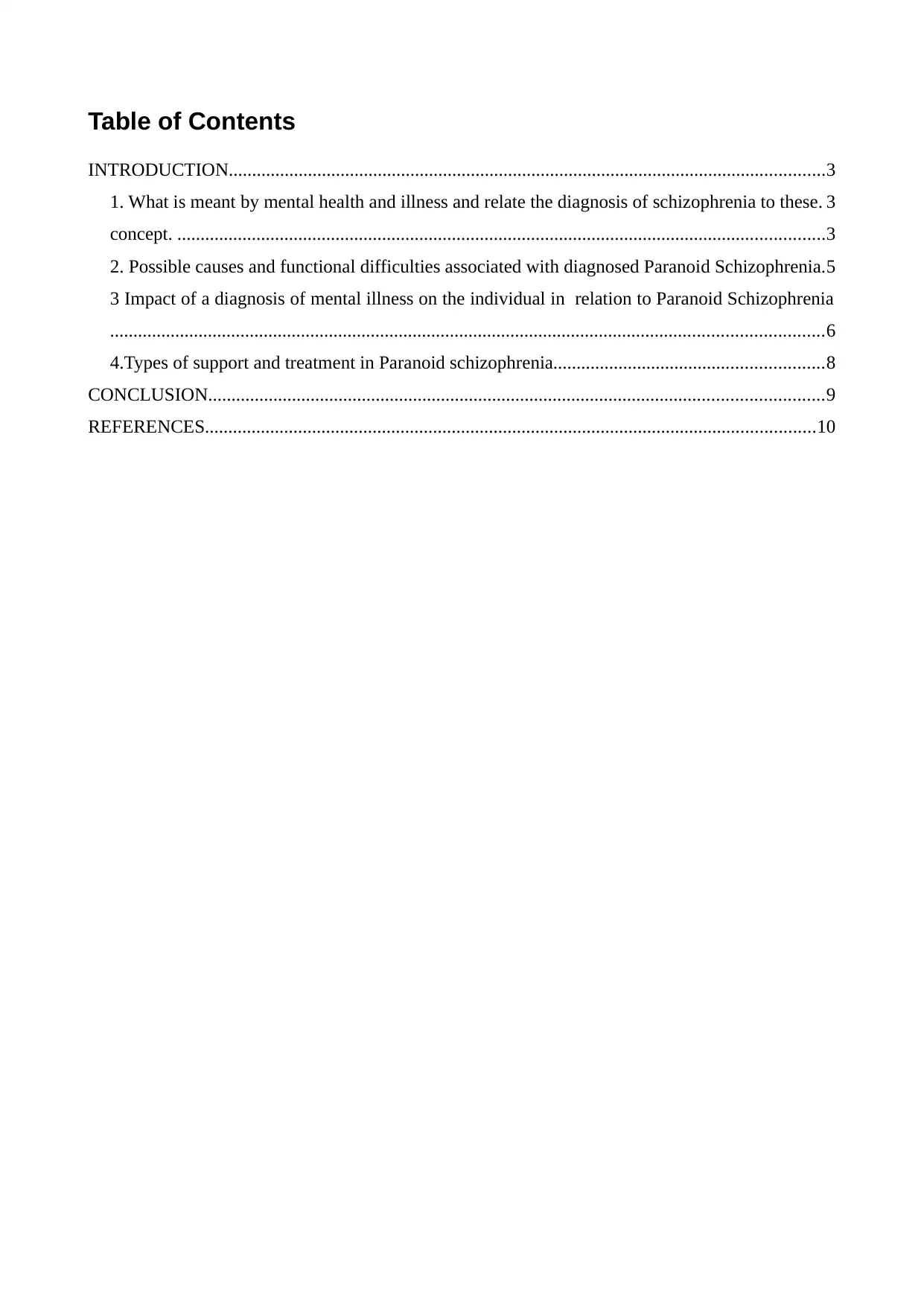
Table of Contents
INTRODUCTION................................................................................................................................3
1. What is meant by mental health and illness and relate the diagnosis of schizophrenia to these. 3
concept. ...........................................................................................................................................3
2. Possible causes and functional difficulties associated with diagnosed Paranoid Schizophrenia.5
3 Impact of a diagnosis of mental illness on the individual in relation to Paranoid Schizophrenia
.........................................................................................................................................................6
4.Types of support and treatment in Paranoid schizophrenia..........................................................8
CONCLUSION....................................................................................................................................9
REFERENCES...................................................................................................................................10
INTRODUCTION................................................................................................................................3
1. What is meant by mental health and illness and relate the diagnosis of schizophrenia to these. 3
concept. ...........................................................................................................................................3
2. Possible causes and functional difficulties associated with diagnosed Paranoid Schizophrenia.5
3 Impact of a diagnosis of mental illness on the individual in relation to Paranoid Schizophrenia
.........................................................................................................................................................6
4.Types of support and treatment in Paranoid schizophrenia..........................................................8
CONCLUSION....................................................................................................................................9
REFERENCES...................................................................................................................................10
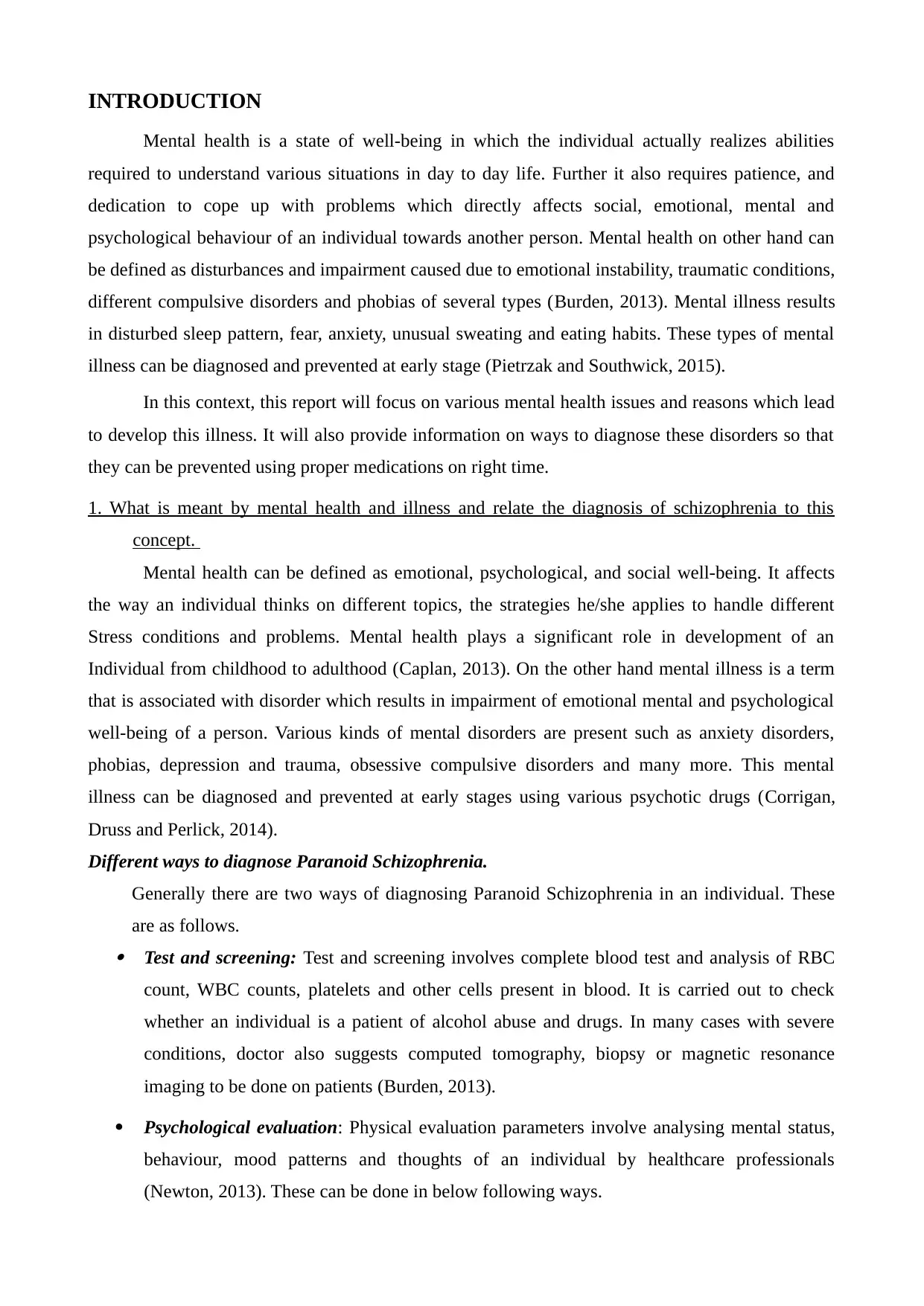
INTRODUCTION
Mental health is a state of well-being in which the individual actually realizes abilities
required to understand various situations in day to day life. Further it also requires patience, and
dedication to cope up with problems which directly affects social, emotional, mental and
psychological behaviour of an individual towards another person. Mental health on other hand can
be defined as disturbances and impairment caused due to emotional instability, traumatic conditions,
different compulsive disorders and phobias of several types (Burden, 2013). Mental illness results
in disturbed sleep pattern, fear, anxiety, unusual sweating and eating habits. These types of mental
illness can be diagnosed and prevented at early stage (Pietrzak and Southwick, 2015).
In this context, this report will focus on various mental health issues and reasons which lead
to develop this illness. It will also provide information on ways to diagnose these disorders so that
they can be prevented using proper medications on right time.
1. What is meant by mental health and illness and relate the diagnosis of schizophrenia to this
concept.
Mental health can be defined as emotional, psychological, and social well-being. It affects
the way an individual thinks on different topics, the strategies he/she applies to handle different
Stress conditions and problems. Mental health plays a significant role in development of an
Individual from childhood to adulthood (Caplan, 2013). On the other hand mental illness is a term
that is associated with disorder which results in impairment of emotional mental and psychological
well-being of a person. Various kinds of mental disorders are present such as anxiety disorders,
phobias, depression and trauma, obsessive compulsive disorders and many more. This mental
illness can be diagnosed and prevented at early stages using various psychotic drugs (Corrigan,
Druss and Perlick, 2014).
Different ways to diagnose Paranoid Schizophrenia.
Generally there are two ways of diagnosing Paranoid Schizophrenia in an individual. These
are as follows. Test and screening: Test and screening involves complete blood test and analysis of RBC
count, WBC counts, platelets and other cells present in blood. It is carried out to check
whether an individual is a patient of alcohol abuse and drugs. In many cases with severe
conditions, doctor also suggests computed tomography, biopsy or magnetic resonance
imaging to be done on patients (Burden, 2013).
Psychological evaluation: Physical evaluation parameters involve analysing mental status,
behaviour, mood patterns and thoughts of an individual by healthcare professionals
(Newton, 2013). These can be done in below following ways.
Mental health is a state of well-being in which the individual actually realizes abilities
required to understand various situations in day to day life. Further it also requires patience, and
dedication to cope up with problems which directly affects social, emotional, mental and
psychological behaviour of an individual towards another person. Mental health on other hand can
be defined as disturbances and impairment caused due to emotional instability, traumatic conditions,
different compulsive disorders and phobias of several types (Burden, 2013). Mental illness results
in disturbed sleep pattern, fear, anxiety, unusual sweating and eating habits. These types of mental
illness can be diagnosed and prevented at early stage (Pietrzak and Southwick, 2015).
In this context, this report will focus on various mental health issues and reasons which lead
to develop this illness. It will also provide information on ways to diagnose these disorders so that
they can be prevented using proper medications on right time.
1. What is meant by mental health and illness and relate the diagnosis of schizophrenia to this
concept.
Mental health can be defined as emotional, psychological, and social well-being. It affects
the way an individual thinks on different topics, the strategies he/she applies to handle different
Stress conditions and problems. Mental health plays a significant role in development of an
Individual from childhood to adulthood (Caplan, 2013). On the other hand mental illness is a term
that is associated with disorder which results in impairment of emotional mental and psychological
well-being of a person. Various kinds of mental disorders are present such as anxiety disorders,
phobias, depression and trauma, obsessive compulsive disorders and many more. This mental
illness can be diagnosed and prevented at early stages using various psychotic drugs (Corrigan,
Druss and Perlick, 2014).
Different ways to diagnose Paranoid Schizophrenia.
Generally there are two ways of diagnosing Paranoid Schizophrenia in an individual. These
are as follows. Test and screening: Test and screening involves complete blood test and analysis of RBC
count, WBC counts, platelets and other cells present in blood. It is carried out to check
whether an individual is a patient of alcohol abuse and drugs. In many cases with severe
conditions, doctor also suggests computed tomography, biopsy or magnetic resonance
imaging to be done on patients (Burden, 2013).
Psychological evaluation: Physical evaluation parameters involve analysing mental status,
behaviour, mood patterns and thoughts of an individual by healthcare professionals
(Newton, 2013). These can be done in below following ways.
⊘ This is a preview!⊘
Do you want full access?
Subscribe today to unlock all pages.

Trusted by 1+ million students worldwide
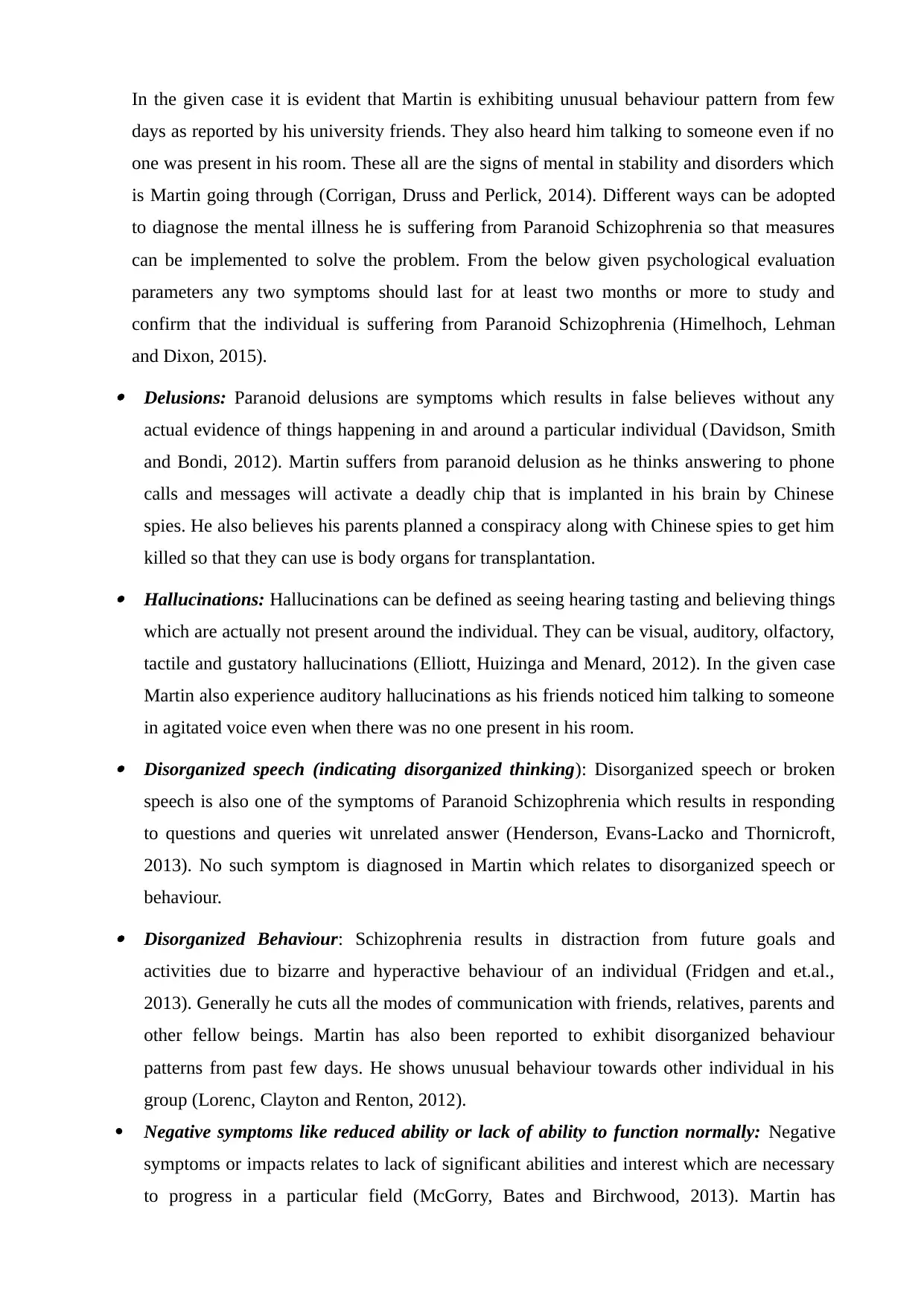
In the given case it is evident that Martin is exhibiting unusual behaviour pattern from few
days as reported by his university friends. They also heard him talking to someone even if no
one was present in his room. These all are the signs of mental in stability and disorders which
is Martin going through (Corrigan, Druss and Perlick, 2014). Different ways can be adopted
to diagnose the mental illness he is suffering from Paranoid Schizophrenia so that measures
can be implemented to solve the problem. From the below given psychological evaluation
parameters any two symptoms should last for at least two months or more to study and
confirm that the individual is suffering from Paranoid Schizophrenia (Himelhoch, Lehman
and Dixon, 2015).
Delusions: Paranoid delusions are symptoms which results in false believes without any
actual evidence of things happening in and around a particular individual (Davidson, Smith
and Bondi, 2012). Martin suffers from paranoid delusion as he thinks answering to phone
calls and messages will activate a deadly chip that is implanted in his brain by Chinese
spies. He also believes his parents planned a conspiracy along with Chinese spies to get him
killed so that they can use is body organs for transplantation.
Hallucinations: Hallucinations can be defined as seeing hearing tasting and believing things
which are actually not present around the individual. They can be visual, auditory, olfactory,
tactile and gustatory hallucinations (Elliott, Huizinga and Menard, 2012). In the given case
Martin also experience auditory hallucinations as his friends noticed him talking to someone
in agitated voice even when there was no one present in his room.
Disorganized speech (indicating disorganized thinking): Disorganized speech or broken
speech is also one of the symptoms of Paranoid Schizophrenia which results in responding
to questions and queries wit unrelated answer (Henderson, Evans-Lacko and Thornicroft,
2013). No such symptom is diagnosed in Martin which relates to disorganized speech or
behaviour.
Disorganized Behaviour: Schizophrenia results in distraction from future goals and
activities due to bizarre and hyperactive behaviour of an individual (Fridgen and et.al.,
2013). Generally he cuts all the modes of communication with friends, relatives, parents and
other fellow beings. Martin has also been reported to exhibit disorganized behaviour
patterns from past few days. He shows unusual behaviour towards other individual in his
group (Lorenc, Clayton and Renton, 2012).
Negative symptoms like reduced ability or lack of ability to function normally: Negative
symptoms or impacts relates to lack of significant abilities and interest which are necessary
to progress in a particular field (McGorry, Bates and Birchwood, 2013). Martin has
days as reported by his university friends. They also heard him talking to someone even if no
one was present in his room. These all are the signs of mental in stability and disorders which
is Martin going through (Corrigan, Druss and Perlick, 2014). Different ways can be adopted
to diagnose the mental illness he is suffering from Paranoid Schizophrenia so that measures
can be implemented to solve the problem. From the below given psychological evaluation
parameters any two symptoms should last for at least two months or more to study and
confirm that the individual is suffering from Paranoid Schizophrenia (Himelhoch, Lehman
and Dixon, 2015).
Delusions: Paranoid delusions are symptoms which results in false believes without any
actual evidence of things happening in and around a particular individual (Davidson, Smith
and Bondi, 2012). Martin suffers from paranoid delusion as he thinks answering to phone
calls and messages will activate a deadly chip that is implanted in his brain by Chinese
spies. He also believes his parents planned a conspiracy along with Chinese spies to get him
killed so that they can use is body organs for transplantation.
Hallucinations: Hallucinations can be defined as seeing hearing tasting and believing things
which are actually not present around the individual. They can be visual, auditory, olfactory,
tactile and gustatory hallucinations (Elliott, Huizinga and Menard, 2012). In the given case
Martin also experience auditory hallucinations as his friends noticed him talking to someone
in agitated voice even when there was no one present in his room.
Disorganized speech (indicating disorganized thinking): Disorganized speech or broken
speech is also one of the symptoms of Paranoid Schizophrenia which results in responding
to questions and queries wit unrelated answer (Henderson, Evans-Lacko and Thornicroft,
2013). No such symptom is diagnosed in Martin which relates to disorganized speech or
behaviour.
Disorganized Behaviour: Schizophrenia results in distraction from future goals and
activities due to bizarre and hyperactive behaviour of an individual (Fridgen and et.al.,
2013). Generally he cuts all the modes of communication with friends, relatives, parents and
other fellow beings. Martin has also been reported to exhibit disorganized behaviour
patterns from past few days. He shows unusual behaviour towards other individual in his
group (Lorenc, Clayton and Renton, 2012).
Negative symptoms like reduced ability or lack of ability to function normally: Negative
symptoms or impacts relates to lack of significant abilities and interest which are necessary
to progress in a particular field (McGorry, Bates and Birchwood, 2013). Martin has
Paraphrase This Document
Need a fresh take? Get an instant paraphrase of this document with our AI Paraphraser
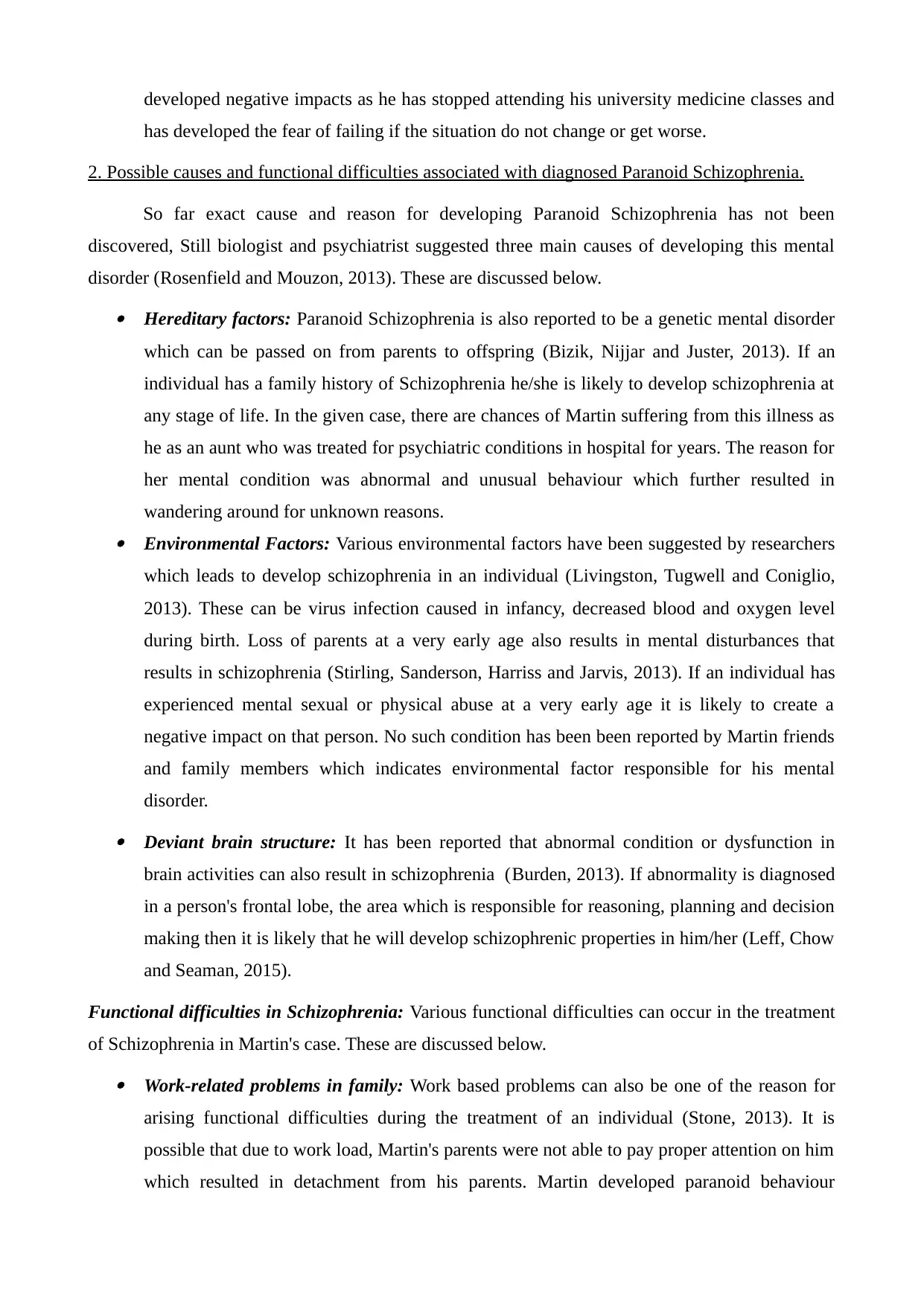
developed negative impacts as he has stopped attending his university medicine classes and
has developed the fear of failing if the situation do not change or get worse.
2. Possible causes and functional difficulties associated with diagnosed Paranoid Schizophrenia.
So far exact cause and reason for developing Paranoid Schizophrenia has not been
discovered, Still biologist and psychiatrist suggested three main causes of developing this mental
disorder (Rosenfield and Mouzon, 2013). These are discussed below.
Hereditary factors: Paranoid Schizophrenia is also reported to be a genetic mental disorder
which can be passed on from parents to offspring (Bizik, Nijjar and Juster, 2013). If an
individual has a family history of Schizophrenia he/she is likely to develop schizophrenia at
any stage of life. In the given case, there are chances of Martin suffering from this illness as
he as an aunt who was treated for psychiatric conditions in hospital for years. The reason for
her mental condition was abnormal and unusual behaviour which further resulted in
wandering around for unknown reasons. Environmental Factors: Various environmental factors have been suggested by researchers
which leads to develop schizophrenia in an individual (Livingston, Tugwell and Coniglio,
2013). These can be virus infection caused in infancy, decreased blood and oxygen level
during birth. Loss of parents at a very early age also results in mental disturbances that
results in schizophrenia (Stirling, Sanderson, Harriss and Jarvis, 2013). If an individual has
experienced mental sexual or physical abuse at a very early age it is likely to create a
negative impact on that person. No such condition has been been reported by Martin friends
and family members which indicates environmental factor responsible for his mental
disorder.
Deviant brain structure: It has been reported that abnormal condition or dysfunction in
brain activities can also result in schizophrenia (Burden, 2013). If abnormality is diagnosed
in a person's frontal lobe, the area which is responsible for reasoning, planning and decision
making then it is likely that he will develop schizophrenic properties in him/her (Leff, Chow
and Seaman, 2015).
Functional difficulties in Schizophrenia: Various functional difficulties can occur in the treatment
of Schizophrenia in Martin's case. These are discussed below.
Work-related problems in family: Work based problems can also be one of the reason for
arising functional difficulties during the treatment of an individual (Stone, 2013). It is
possible that due to work load, Martin's parents were not able to pay proper attention on him
which resulted in detachment from his parents. Martin developed paranoid behaviour
has developed the fear of failing if the situation do not change or get worse.
2. Possible causes and functional difficulties associated with diagnosed Paranoid Schizophrenia.
So far exact cause and reason for developing Paranoid Schizophrenia has not been
discovered, Still biologist and psychiatrist suggested three main causes of developing this mental
disorder (Rosenfield and Mouzon, 2013). These are discussed below.
Hereditary factors: Paranoid Schizophrenia is also reported to be a genetic mental disorder
which can be passed on from parents to offspring (Bizik, Nijjar and Juster, 2013). If an
individual has a family history of Schizophrenia he/she is likely to develop schizophrenia at
any stage of life. In the given case, there are chances of Martin suffering from this illness as
he as an aunt who was treated for psychiatric conditions in hospital for years. The reason for
her mental condition was abnormal and unusual behaviour which further resulted in
wandering around for unknown reasons. Environmental Factors: Various environmental factors have been suggested by researchers
which leads to develop schizophrenia in an individual (Livingston, Tugwell and Coniglio,
2013). These can be virus infection caused in infancy, decreased blood and oxygen level
during birth. Loss of parents at a very early age also results in mental disturbances that
results in schizophrenia (Stirling, Sanderson, Harriss and Jarvis, 2013). If an individual has
experienced mental sexual or physical abuse at a very early age it is likely to create a
negative impact on that person. No such condition has been been reported by Martin friends
and family members which indicates environmental factor responsible for his mental
disorder.
Deviant brain structure: It has been reported that abnormal condition or dysfunction in
brain activities can also result in schizophrenia (Burden, 2013). If abnormality is diagnosed
in a person's frontal lobe, the area which is responsible for reasoning, planning and decision
making then it is likely that he will develop schizophrenic properties in him/her (Leff, Chow
and Seaman, 2015).
Functional difficulties in Schizophrenia: Various functional difficulties can occur in the treatment
of Schizophrenia in Martin's case. These are discussed below.
Work-related problems in family: Work based problems can also be one of the reason for
arising functional difficulties during the treatment of an individual (Stone, 2013). It is
possible that due to work load, Martin's parents were not able to pay proper attention on him
which resulted in detachment from his parents. Martin developed paranoid behaviour
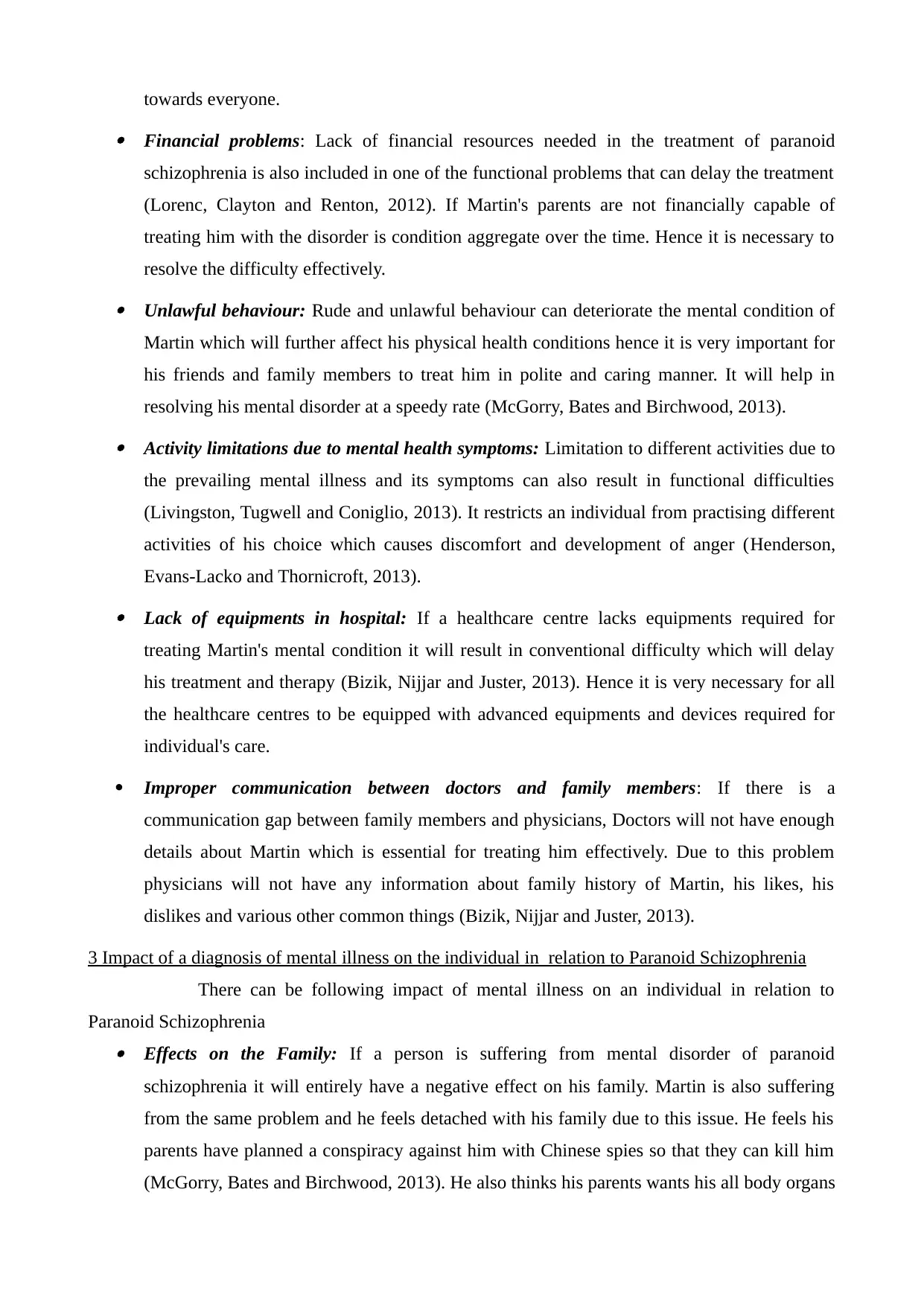
towards everyone.
Financial problems: Lack of financial resources needed in the treatment of paranoid
schizophrenia is also included in one of the functional problems that can delay the treatment
(Lorenc, Clayton and Renton, 2012). If Martin's parents are not financially capable of
treating him with the disorder is condition aggregate over the time. Hence it is necessary to
resolve the difficulty effectively.
Unlawful behaviour: Rude and unlawful behaviour can deteriorate the mental condition of
Martin which will further affect his physical health conditions hence it is very important for
his friends and family members to treat him in polite and caring manner. It will help in
resolving his mental disorder at a speedy rate (McGorry, Bates and Birchwood, 2013).
Activity limitations due to mental health symptoms: Limitation to different activities due to
the prevailing mental illness and its symptoms can also result in functional difficulties
(Livingston, Tugwell and Coniglio, 2013). It restricts an individual from practising different
activities of his choice which causes discomfort and development of anger (Henderson,
Evans-Lacko and Thornicroft, 2013).
Lack of equipments in hospital: If a healthcare centre lacks equipments required for
treating Martin's mental condition it will result in conventional difficulty which will delay
his treatment and therapy (Bizik, Nijjar and Juster, 2013). Hence it is very necessary for all
the healthcare centres to be equipped with advanced equipments and devices required for
individual's care.
Improper communication between doctors and family members: If there is a
communication gap between family members and physicians, Doctors will not have enough
details about Martin which is essential for treating him effectively. Due to this problem
physicians will not have any information about family history of Martin, his likes, his
dislikes and various other common things (Bizik, Nijjar and Juster, 2013).
3 Impact of a diagnosis of mental illness on the individual in relation to Paranoid Schizophrenia
There can be following impact of mental illness on an individual in relation to
Paranoid Schizophrenia Effects on the Family: If a person is suffering from mental disorder of paranoid
schizophrenia it will entirely have a negative effect on his family. Martin is also suffering
from the same problem and he feels detached with his family due to this issue. He feels his
parents have planned a conspiracy against him with Chinese spies so that they can kill him
(McGorry, Bates and Birchwood, 2013). He also thinks his parents wants his all body organs
Financial problems: Lack of financial resources needed in the treatment of paranoid
schizophrenia is also included in one of the functional problems that can delay the treatment
(Lorenc, Clayton and Renton, 2012). If Martin's parents are not financially capable of
treating him with the disorder is condition aggregate over the time. Hence it is necessary to
resolve the difficulty effectively.
Unlawful behaviour: Rude and unlawful behaviour can deteriorate the mental condition of
Martin which will further affect his physical health conditions hence it is very important for
his friends and family members to treat him in polite and caring manner. It will help in
resolving his mental disorder at a speedy rate (McGorry, Bates and Birchwood, 2013).
Activity limitations due to mental health symptoms: Limitation to different activities due to
the prevailing mental illness and its symptoms can also result in functional difficulties
(Livingston, Tugwell and Coniglio, 2013). It restricts an individual from practising different
activities of his choice which causes discomfort and development of anger (Henderson,
Evans-Lacko and Thornicroft, 2013).
Lack of equipments in hospital: If a healthcare centre lacks equipments required for
treating Martin's mental condition it will result in conventional difficulty which will delay
his treatment and therapy (Bizik, Nijjar and Juster, 2013). Hence it is very necessary for all
the healthcare centres to be equipped with advanced equipments and devices required for
individual's care.
Improper communication between doctors and family members: If there is a
communication gap between family members and physicians, Doctors will not have enough
details about Martin which is essential for treating him effectively. Due to this problem
physicians will not have any information about family history of Martin, his likes, his
dislikes and various other common things (Bizik, Nijjar and Juster, 2013).
3 Impact of a diagnosis of mental illness on the individual in relation to Paranoid Schizophrenia
There can be following impact of mental illness on an individual in relation to
Paranoid Schizophrenia Effects on the Family: If a person is suffering from mental disorder of paranoid
schizophrenia it will entirely have a negative effect on his family. Martin is also suffering
from the same problem and he feels detached with his family due to this issue. He feels his
parents have planned a conspiracy against him with Chinese spies so that they can kill him
(McGorry, Bates and Birchwood, 2013). He also thinks his parents wants his all body organs
⊘ This is a preview!⊘
Do you want full access?
Subscribe today to unlock all pages.

Trusted by 1+ million students worldwide
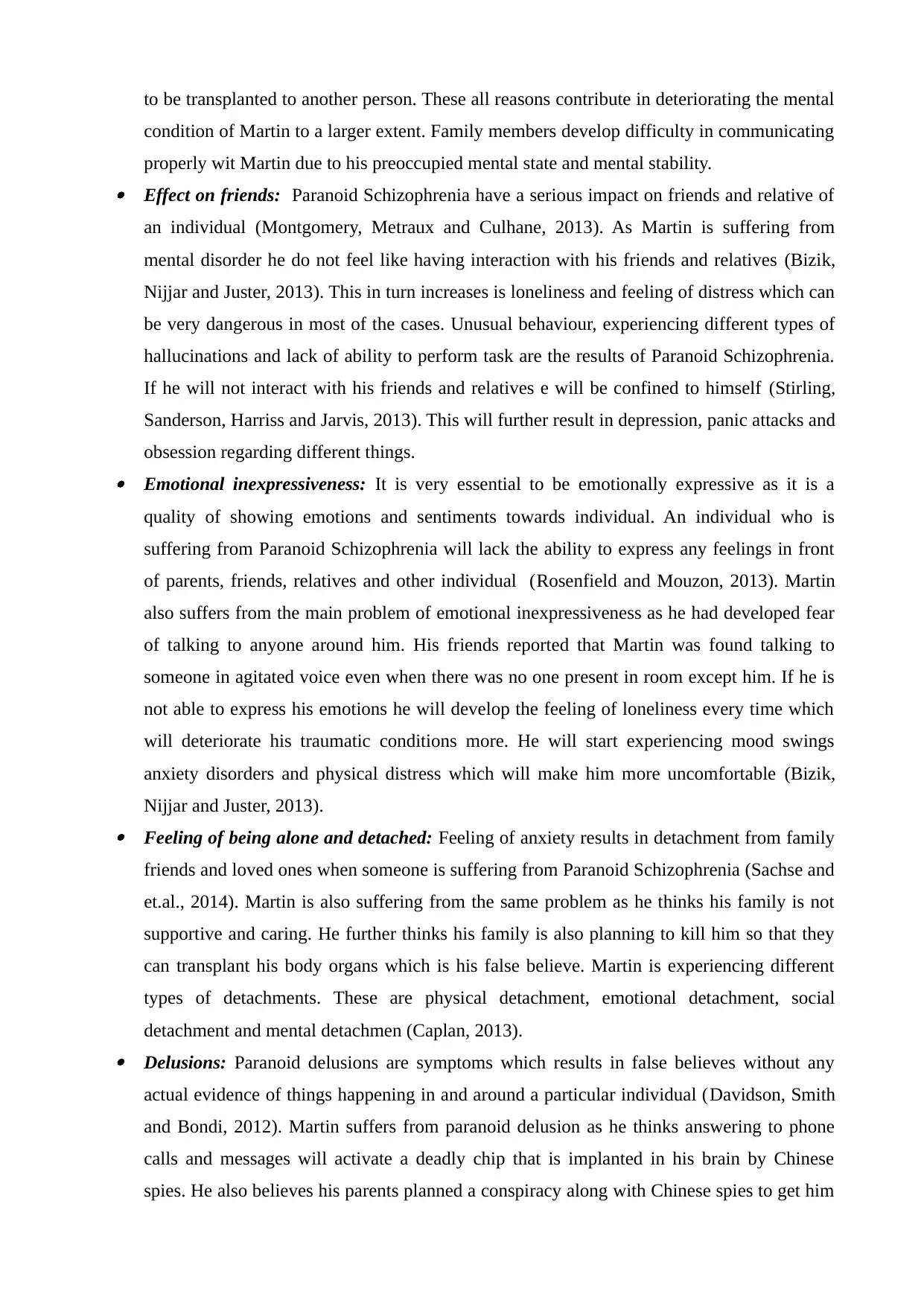
to be transplanted to another person. These all reasons contribute in deteriorating the mental
condition of Martin to a larger extent. Family members develop difficulty in communicating
properly wit Martin due to his preoccupied mental state and mental stability. Effect on friends: Paranoid Schizophrenia have a serious impact on friends and relative of
an individual (Montgomery, Metraux and Culhane, 2013). As Martin is suffering from
mental disorder he do not feel like having interaction with his friends and relatives (Bizik,
Nijjar and Juster, 2013). This in turn increases is loneliness and feeling of distress which can
be very dangerous in most of the cases. Unusual behaviour, experiencing different types of
hallucinations and lack of ability to perform task are the results of Paranoid Schizophrenia.
If he will not interact with his friends and relatives e will be confined to himself (Stirling,
Sanderson, Harriss and Jarvis, 2013). This will further result in depression, panic attacks and
obsession regarding different things. Emotional inexpressiveness: It is very essential to be emotionally expressive as it is a
quality of showing emotions and sentiments towards individual. An individual who is
suffering from Paranoid Schizophrenia will lack the ability to express any feelings in front
of parents, friends, relatives and other individual (Rosenfield and Mouzon, 2013). Martin
also suffers from the main problem of emotional inexpressiveness as he had developed fear
of talking to anyone around him. His friends reported that Martin was found talking to
someone in agitated voice even when there was no one present in room except him. If he is
not able to express his emotions he will develop the feeling of loneliness every time which
will deteriorate his traumatic conditions more. He will start experiencing mood swings
anxiety disorders and physical distress which will make him more uncomfortable (Bizik,
Nijjar and Juster, 2013). Feeling of being alone and detached: Feeling of anxiety results in detachment from family
friends and loved ones when someone is suffering from Paranoid Schizophrenia (Sachse and
et.al., 2014). Martin is also suffering from the same problem as he thinks his family is not
supportive and caring. He further thinks his family is also planning to kill him so that they
can transplant his body organs which is his false believe. Martin is experiencing different
types of detachments. These are physical detachment, emotional detachment, social
detachment and mental detachmen (Caplan, 2013). Delusions: Paranoid delusions are symptoms which results in false believes without any
actual evidence of things happening in and around a particular individual (Davidson, Smith
and Bondi, 2012). Martin suffers from paranoid delusion as he thinks answering to phone
calls and messages will activate a deadly chip that is implanted in his brain by Chinese
spies. He also believes his parents planned a conspiracy along with Chinese spies to get him
condition of Martin to a larger extent. Family members develop difficulty in communicating
properly wit Martin due to his preoccupied mental state and mental stability. Effect on friends: Paranoid Schizophrenia have a serious impact on friends and relative of
an individual (Montgomery, Metraux and Culhane, 2013). As Martin is suffering from
mental disorder he do not feel like having interaction with his friends and relatives (Bizik,
Nijjar and Juster, 2013). This in turn increases is loneliness and feeling of distress which can
be very dangerous in most of the cases. Unusual behaviour, experiencing different types of
hallucinations and lack of ability to perform task are the results of Paranoid Schizophrenia.
If he will not interact with his friends and relatives e will be confined to himself (Stirling,
Sanderson, Harriss and Jarvis, 2013). This will further result in depression, panic attacks and
obsession regarding different things. Emotional inexpressiveness: It is very essential to be emotionally expressive as it is a
quality of showing emotions and sentiments towards individual. An individual who is
suffering from Paranoid Schizophrenia will lack the ability to express any feelings in front
of parents, friends, relatives and other individual (Rosenfield and Mouzon, 2013). Martin
also suffers from the main problem of emotional inexpressiveness as he had developed fear
of talking to anyone around him. His friends reported that Martin was found talking to
someone in agitated voice even when there was no one present in room except him. If he is
not able to express his emotions he will develop the feeling of loneliness every time which
will deteriorate his traumatic conditions more. He will start experiencing mood swings
anxiety disorders and physical distress which will make him more uncomfortable (Bizik,
Nijjar and Juster, 2013). Feeling of being alone and detached: Feeling of anxiety results in detachment from family
friends and loved ones when someone is suffering from Paranoid Schizophrenia (Sachse and
et.al., 2014). Martin is also suffering from the same problem as he thinks his family is not
supportive and caring. He further thinks his family is also planning to kill him so that they
can transplant his body organs which is his false believe. Martin is experiencing different
types of detachments. These are physical detachment, emotional detachment, social
detachment and mental detachmen (Caplan, 2013). Delusions: Paranoid delusions are symptoms which results in false believes without any
actual evidence of things happening in and around a particular individual (Davidson, Smith
and Bondi, 2012). Martin suffers from paranoid delusion as he thinks answering to phone
calls and messages will activate a deadly chip that is implanted in his brain by Chinese
spies. He also believes his parents planned a conspiracy along with Chinese spies to get him
Paraphrase This Document
Need a fresh take? Get an instant paraphrase of this document with our AI Paraphraser
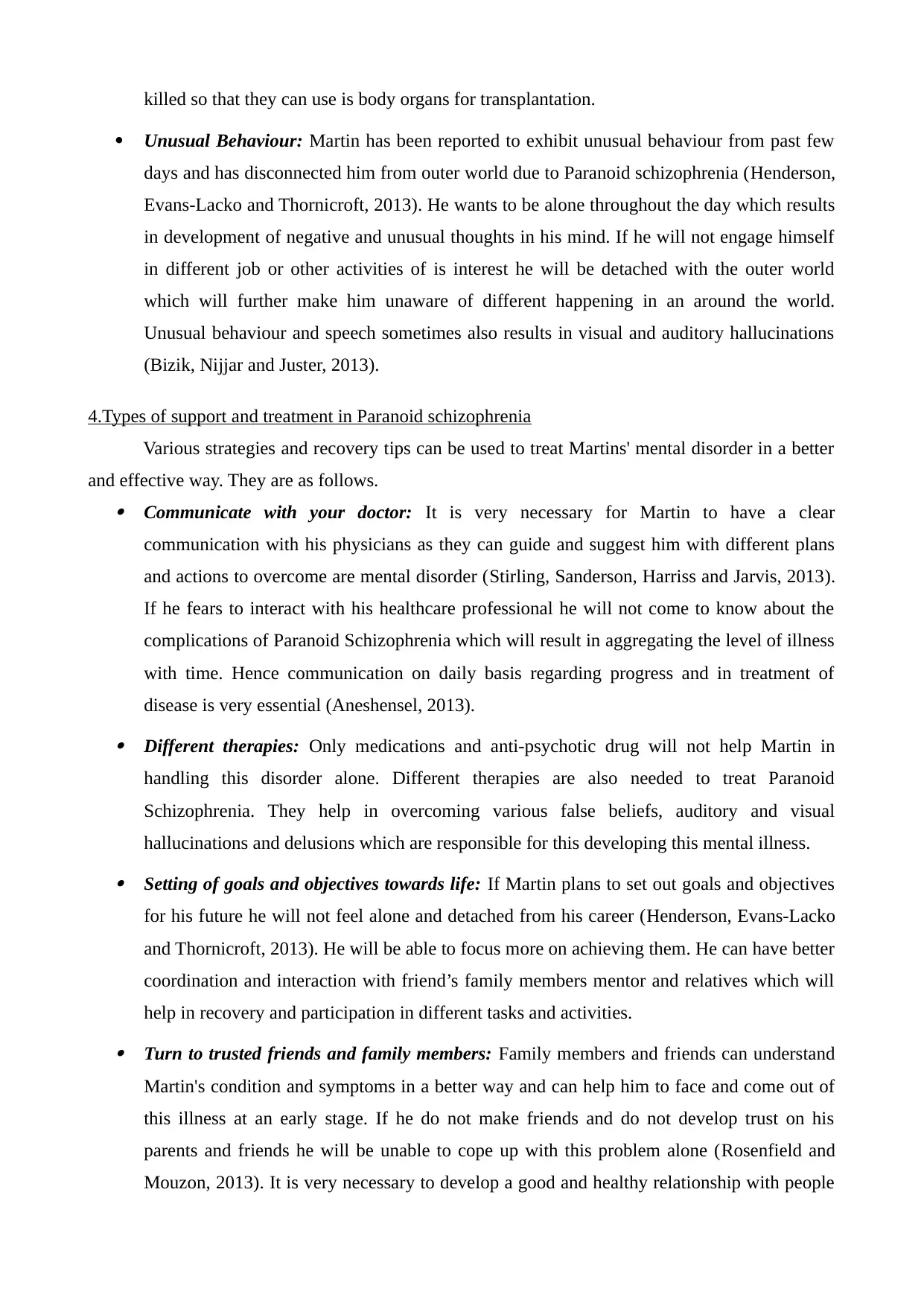
killed so that they can use is body organs for transplantation.
Unusual Behaviour: Martin has been reported to exhibit unusual behaviour from past few
days and has disconnected him from outer world due to Paranoid schizophrenia (Henderson,
Evans-Lacko and Thornicroft, 2013). He wants to be alone throughout the day which results
in development of negative and unusual thoughts in his mind. If he will not engage himself
in different job or other activities of is interest he will be detached with the outer world
which will further make him unaware of different happening in an around the world.
Unusual behaviour and speech sometimes also results in visual and auditory hallucinations
(Bizik, Nijjar and Juster, 2013).
4.Types of support and treatment in Paranoid schizophrenia
Various strategies and recovery tips can be used to treat Martins' mental disorder in a better
and effective way. They are as follows. Communicate with your doctor: It is very necessary for Martin to have a clear
communication with his physicians as they can guide and suggest him with different plans
and actions to overcome are mental disorder (Stirling, Sanderson, Harriss and Jarvis, 2013).
If he fears to interact with his healthcare professional he will not come to know about the
complications of Paranoid Schizophrenia which will result in aggregating the level of illness
with time. Hence communication on daily basis regarding progress and in treatment of
disease is very essential (Aneshensel, 2013).
Different therapies: Only medications and anti-psychotic drug will not help Martin in
handling this disorder alone. Different therapies are also needed to treat Paranoid
Schizophrenia. They help in overcoming various false beliefs, auditory and visual
hallucinations and delusions which are responsible for this developing this mental illness.
Setting of goals and objectives towards life: If Martin plans to set out goals and objectives
for his future he will not feel alone and detached from his career (Henderson, Evans-Lacko
and Thornicroft, 2013). He will be able to focus more on achieving them. He can have better
coordination and interaction with friend’s family members mentor and relatives which will
help in recovery and participation in different tasks and activities.
Turn to trusted friends and family members: Family members and friends can understand
Martin's condition and symptoms in a better way and can help him to face and come out of
this illness at an early stage. If he do not make friends and do not develop trust on his
parents and friends he will be unable to cope up with this problem alone (Rosenfield and
Mouzon, 2013). It is very necessary to develop a good and healthy relationship with people
Unusual Behaviour: Martin has been reported to exhibit unusual behaviour from past few
days and has disconnected him from outer world due to Paranoid schizophrenia (Henderson,
Evans-Lacko and Thornicroft, 2013). He wants to be alone throughout the day which results
in development of negative and unusual thoughts in his mind. If he will not engage himself
in different job or other activities of is interest he will be detached with the outer world
which will further make him unaware of different happening in an around the world.
Unusual behaviour and speech sometimes also results in visual and auditory hallucinations
(Bizik, Nijjar and Juster, 2013).
4.Types of support and treatment in Paranoid schizophrenia
Various strategies and recovery tips can be used to treat Martins' mental disorder in a better
and effective way. They are as follows. Communicate with your doctor: It is very necessary for Martin to have a clear
communication with his physicians as they can guide and suggest him with different plans
and actions to overcome are mental disorder (Stirling, Sanderson, Harriss and Jarvis, 2013).
If he fears to interact with his healthcare professional he will not come to know about the
complications of Paranoid Schizophrenia which will result in aggregating the level of illness
with time. Hence communication on daily basis regarding progress and in treatment of
disease is very essential (Aneshensel, 2013).
Different therapies: Only medications and anti-psychotic drug will not help Martin in
handling this disorder alone. Different therapies are also needed to treat Paranoid
Schizophrenia. They help in overcoming various false beliefs, auditory and visual
hallucinations and delusions which are responsible for this developing this mental illness.
Setting of goals and objectives towards life: If Martin plans to set out goals and objectives
for his future he will not feel alone and detached from his career (Henderson, Evans-Lacko
and Thornicroft, 2013). He will be able to focus more on achieving them. He can have better
coordination and interaction with friend’s family members mentor and relatives which will
help in recovery and participation in different tasks and activities.
Turn to trusted friends and family members: Family members and friends can understand
Martin's condition and symptoms in a better way and can help him to face and come out of
this illness at an early stage. If he do not make friends and do not develop trust on his
parents and friends he will be unable to cope up with this problem alone (Rosenfield and
Mouzon, 2013). It is very necessary to develop a good and healthy relationship with people
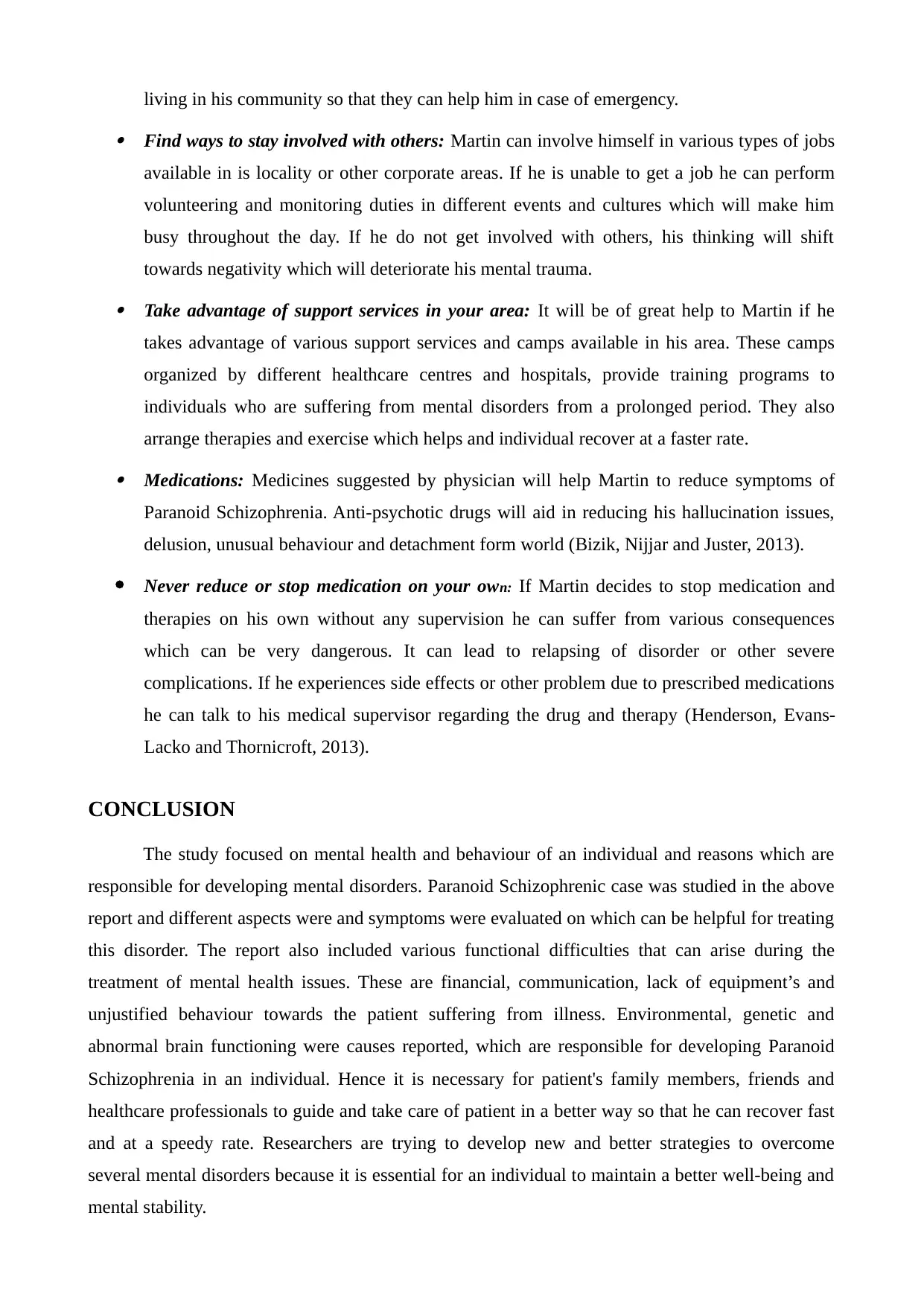
living in his community so that they can help him in case of emergency.
Find ways to stay involved with others: Martin can involve himself in various types of jobs
available in is locality or other corporate areas. If he is unable to get a job he can perform
volunteering and monitoring duties in different events and cultures which will make him
busy throughout the day. If he do not get involved with others, his thinking will shift
towards negativity which will deteriorate his mental trauma.
Take advantage of support services in your area: It will be of great help to Martin if he
takes advantage of various support services and camps available in his area. These camps
organized by different healthcare centres and hospitals, provide training programs to
individuals who are suffering from mental disorders from a prolonged period. They also
arrange therapies and exercise which helps and individual recover at a faster rate.
Medications: Medicines suggested by physician will help Martin to reduce symptoms of
Paranoid Schizophrenia. Anti-psychotic drugs will aid in reducing his hallucination issues,
delusion, unusual behaviour and detachment form world (Bizik, Nijjar and Juster, 2013).
Never reduce or stop medication on your own: If Martin decides to stop medication and
therapies on his own without any supervision he can suffer from various consequences
which can be very dangerous. It can lead to relapsing of disorder or other severe
complications. If he experiences side effects or other problem due to prescribed medications
he can talk to his medical supervisor regarding the drug and therapy (Henderson, Evans-
Lacko and Thornicroft, 2013).
CONCLUSION
The study focused on mental health and behaviour of an individual and reasons which are
responsible for developing mental disorders. Paranoid Schizophrenic case was studied in the above
report and different aspects were and symptoms were evaluated on which can be helpful for treating
this disorder. The report also included various functional difficulties that can arise during the
treatment of mental health issues. These are financial, communication, lack of equipment’s and
unjustified behaviour towards the patient suffering from illness. Environmental, genetic and
abnormal brain functioning were causes reported, which are responsible for developing Paranoid
Schizophrenia in an individual. Hence it is necessary for patient's family members, friends and
healthcare professionals to guide and take care of patient in a better way so that he can recover fast
and at a speedy rate. Researchers are trying to develop new and better strategies to overcome
several mental disorders because it is essential for an individual to maintain a better well-being and
mental stability.
Find ways to stay involved with others: Martin can involve himself in various types of jobs
available in is locality or other corporate areas. If he is unable to get a job he can perform
volunteering and monitoring duties in different events and cultures which will make him
busy throughout the day. If he do not get involved with others, his thinking will shift
towards negativity which will deteriorate his mental trauma.
Take advantage of support services in your area: It will be of great help to Martin if he
takes advantage of various support services and camps available in his area. These camps
organized by different healthcare centres and hospitals, provide training programs to
individuals who are suffering from mental disorders from a prolonged period. They also
arrange therapies and exercise which helps and individual recover at a faster rate.
Medications: Medicines suggested by physician will help Martin to reduce symptoms of
Paranoid Schizophrenia. Anti-psychotic drugs will aid in reducing his hallucination issues,
delusion, unusual behaviour and detachment form world (Bizik, Nijjar and Juster, 2013).
Never reduce or stop medication on your own: If Martin decides to stop medication and
therapies on his own without any supervision he can suffer from various consequences
which can be very dangerous. It can lead to relapsing of disorder or other severe
complications. If he experiences side effects or other problem due to prescribed medications
he can talk to his medical supervisor regarding the drug and therapy (Henderson, Evans-
Lacko and Thornicroft, 2013).
CONCLUSION
The study focused on mental health and behaviour of an individual and reasons which are
responsible for developing mental disorders. Paranoid Schizophrenic case was studied in the above
report and different aspects were and symptoms were evaluated on which can be helpful for treating
this disorder. The report also included various functional difficulties that can arise during the
treatment of mental health issues. These are financial, communication, lack of equipment’s and
unjustified behaviour towards the patient suffering from illness. Environmental, genetic and
abnormal brain functioning were causes reported, which are responsible for developing Paranoid
Schizophrenia in an individual. Hence it is necessary for patient's family members, friends and
healthcare professionals to guide and take care of patient in a better way so that he can recover fast
and at a speedy rate. Researchers are trying to develop new and better strategies to overcome
several mental disorders because it is essential for an individual to maintain a better well-being and
mental stability.
⊘ This is a preview!⊘
Do you want full access?
Subscribe today to unlock all pages.

Trusted by 1+ million students worldwide
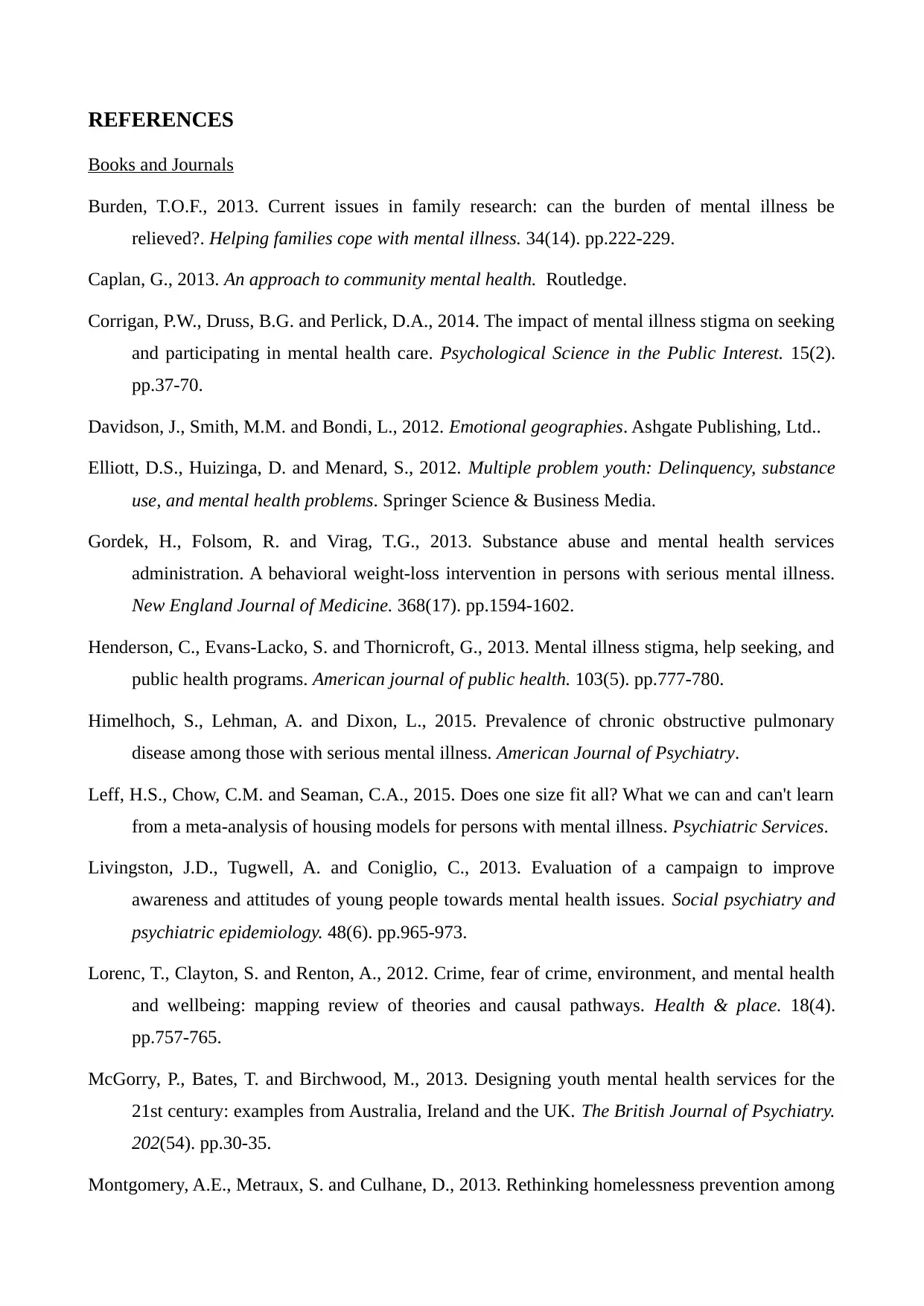
REFERENCES
Books and Journals
Burden, T.O.F., 2013. Current issues in family research: can the burden of mental illness be
relieved?. Helping families cope with mental illness. 34(14). pp.222-229.
Caplan, G., 2013. An approach to community mental health. Routledge.
Corrigan, P.W., Druss, B.G. and Perlick, D.A., 2014. The impact of mental illness stigma on seeking
and participating in mental health care. Psychological Science in the Public Interest. 15(2).
pp.37-70.
Davidson, J., Smith, M.M. and Bondi, L., 2012. Emotional geographies. Ashgate Publishing, Ltd..
Elliott, D.S., Huizinga, D. and Menard, S., 2012. Multiple problem youth: Delinquency, substance
use, and mental health problems. Springer Science & Business Media.
Gordek, H., Folsom, R. and Virag, T.G., 2013. Substance abuse and mental health services
administration. A behavioral weight-loss intervention in persons with serious mental illness.
New England Journal of Medicine. 368(17). pp.1594-1602.
Henderson, C., Evans-Lacko, S. and Thornicroft, G., 2013. Mental illness stigma, help seeking, and
public health programs. American journal of public health. 103(5). pp.777-780.
Himelhoch, S., Lehman, A. and Dixon, L., 2015. Prevalence of chronic obstructive pulmonary
disease among those with serious mental illness. American Journal of Psychiatry.
Leff, H.S., Chow, C.M. and Seaman, C.A., 2015. Does one size fit all? What we can and can't learn
from a meta-analysis of housing models for persons with mental illness. Psychiatric Services.
Livingston, J.D., Tugwell, A. and Coniglio, C., 2013. Evaluation of a campaign to improve
awareness and attitudes of young people towards mental health issues. Social psychiatry and
psychiatric epidemiology. 48(6). pp.965-973.
Lorenc, T., Clayton, S. and Renton, A., 2012. Crime, fear of crime, environment, and mental health
and wellbeing: mapping review of theories and causal pathways. Health & place. 18(4).
pp.757-765.
McGorry, P., Bates, T. and Birchwood, M., 2013. Designing youth mental health services for the
21st century: examples from Australia, Ireland and the UK. The British Journal of Psychiatry.
202(54). pp.30-35.
Montgomery, A.E., Metraux, S. and Culhane, D., 2013. Rethinking homelessness prevention among
Books and Journals
Burden, T.O.F., 2013. Current issues in family research: can the burden of mental illness be
relieved?. Helping families cope with mental illness. 34(14). pp.222-229.
Caplan, G., 2013. An approach to community mental health. Routledge.
Corrigan, P.W., Druss, B.G. and Perlick, D.A., 2014. The impact of mental illness stigma on seeking
and participating in mental health care. Psychological Science in the Public Interest. 15(2).
pp.37-70.
Davidson, J., Smith, M.M. and Bondi, L., 2012. Emotional geographies. Ashgate Publishing, Ltd..
Elliott, D.S., Huizinga, D. and Menard, S., 2012. Multiple problem youth: Delinquency, substance
use, and mental health problems. Springer Science & Business Media.
Gordek, H., Folsom, R. and Virag, T.G., 2013. Substance abuse and mental health services
administration. A behavioral weight-loss intervention in persons with serious mental illness.
New England Journal of Medicine. 368(17). pp.1594-1602.
Henderson, C., Evans-Lacko, S. and Thornicroft, G., 2013. Mental illness stigma, help seeking, and
public health programs. American journal of public health. 103(5). pp.777-780.
Himelhoch, S., Lehman, A. and Dixon, L., 2015. Prevalence of chronic obstructive pulmonary
disease among those with serious mental illness. American Journal of Psychiatry.
Leff, H.S., Chow, C.M. and Seaman, C.A., 2015. Does one size fit all? What we can and can't learn
from a meta-analysis of housing models for persons with mental illness. Psychiatric Services.
Livingston, J.D., Tugwell, A. and Coniglio, C., 2013. Evaluation of a campaign to improve
awareness and attitudes of young people towards mental health issues. Social psychiatry and
psychiatric epidemiology. 48(6). pp.965-973.
Lorenc, T., Clayton, S. and Renton, A., 2012. Crime, fear of crime, environment, and mental health
and wellbeing: mapping review of theories and causal pathways. Health & place. 18(4).
pp.757-765.
McGorry, P., Bates, T. and Birchwood, M., 2013. Designing youth mental health services for the
21st century: examples from Australia, Ireland and the UK. The British Journal of Psychiatry.
202(54). pp.30-35.
Montgomery, A.E., Metraux, S. and Culhane, D., 2013. Rethinking homelessness prevention among
Paraphrase This Document
Need a fresh take? Get an instant paraphrase of this document with our AI Paraphraser
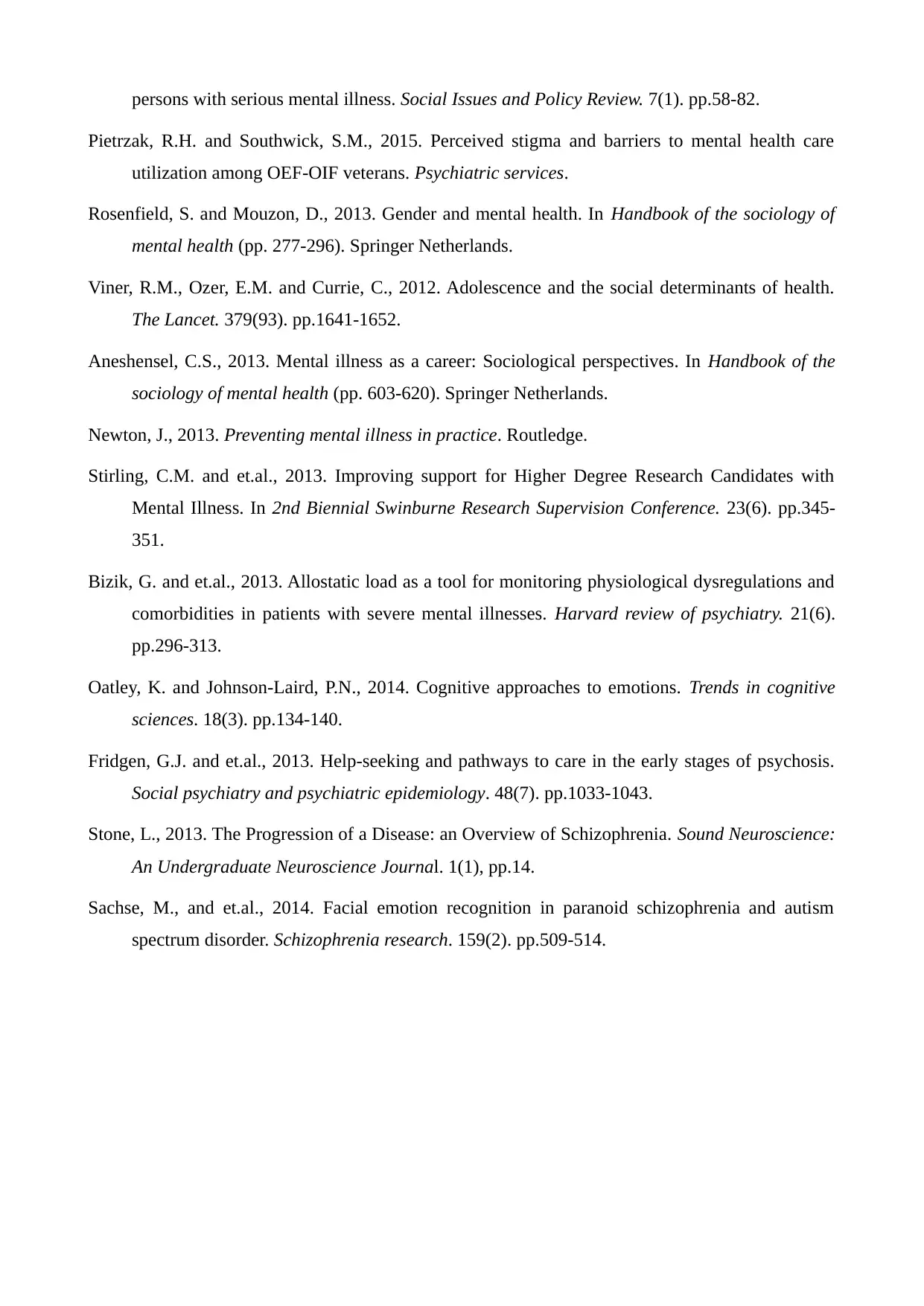
persons with serious mental illness. Social Issues and Policy Review. 7(1). pp.58-82.
Pietrzak, R.H. and Southwick, S.M., 2015. Perceived stigma and barriers to mental health care
utilization among OEF-OIF veterans. Psychiatric services.
Rosenfield, S. and Mouzon, D., 2013. Gender and mental health. In Handbook of the sociology of
mental health (pp. 277-296). Springer Netherlands.
Viner, R.M., Ozer, E.M. and Currie, C., 2012. Adolescence and the social determinants of health.
The Lancet. 379(93). pp.1641-1652.
Aneshensel, C.S., 2013. Mental illness as a career: Sociological perspectives. In Handbook of the
sociology of mental health (pp. 603-620). Springer Netherlands.
Newton, J., 2013. Preventing mental illness in practice. Routledge.
Stirling, C.M. and et.al., 2013. Improving support for Higher Degree Research Candidates with
Mental Illness. In 2nd Biennial Swinburne Research Supervision Conference. 23(6). pp.345-
351.
Bizik, G. and et.al., 2013. Allostatic load as a tool for monitoring physiological dysregulations and
comorbidities in patients with severe mental illnesses. Harvard review of psychiatry. 21(6).
pp.296-313.
Oatley, K. and Johnson-Laird, P.N., 2014. Cognitive approaches to emotions. Trends in cognitive
sciences. 18(3). pp.134-140.
Fridgen, G.J. and et.al., 2013. Help-seeking and pathways to care in the early stages of psychosis.
Social psychiatry and psychiatric epidemiology. 48(7). pp.1033-1043.
Stone, L., 2013. The Progression of a Disease: an Overview of Schizophrenia. Sound Neuroscience:
An Undergraduate Neuroscience Journal. 1(1), pp.14.
Sachse, M., and et.al., 2014. Facial emotion recognition in paranoid schizophrenia and autism
spectrum disorder. Schizophrenia research. 159(2). pp.509-514.
Pietrzak, R.H. and Southwick, S.M., 2015. Perceived stigma and barriers to mental health care
utilization among OEF-OIF veterans. Psychiatric services.
Rosenfield, S. and Mouzon, D., 2013. Gender and mental health. In Handbook of the sociology of
mental health (pp. 277-296). Springer Netherlands.
Viner, R.M., Ozer, E.M. and Currie, C., 2012. Adolescence and the social determinants of health.
The Lancet. 379(93). pp.1641-1652.
Aneshensel, C.S., 2013. Mental illness as a career: Sociological perspectives. In Handbook of the
sociology of mental health (pp. 603-620). Springer Netherlands.
Newton, J., 2013. Preventing mental illness in practice. Routledge.
Stirling, C.M. and et.al., 2013. Improving support for Higher Degree Research Candidates with
Mental Illness. In 2nd Biennial Swinburne Research Supervision Conference. 23(6). pp.345-
351.
Bizik, G. and et.al., 2013. Allostatic load as a tool for monitoring physiological dysregulations and
comorbidities in patients with severe mental illnesses. Harvard review of psychiatry. 21(6).
pp.296-313.
Oatley, K. and Johnson-Laird, P.N., 2014. Cognitive approaches to emotions. Trends in cognitive
sciences. 18(3). pp.134-140.
Fridgen, G.J. and et.al., 2013. Help-seeking and pathways to care in the early stages of psychosis.
Social psychiatry and psychiatric epidemiology. 48(7). pp.1033-1043.
Stone, L., 2013. The Progression of a Disease: an Overview of Schizophrenia. Sound Neuroscience:
An Undergraduate Neuroscience Journal. 1(1), pp.14.
Sachse, M., and et.al., 2014. Facial emotion recognition in paranoid schizophrenia and autism
spectrum disorder. Schizophrenia research. 159(2). pp.509-514.
1 out of 11
Related Documents
Your All-in-One AI-Powered Toolkit for Academic Success.
+13062052269
info@desklib.com
Available 24*7 on WhatsApp / Email
![[object Object]](/_next/static/media/star-bottom.7253800d.svg)
Unlock your academic potential
Copyright © 2020–2026 A2Z Services. All Rights Reserved. Developed and managed by ZUCOL.




